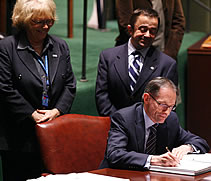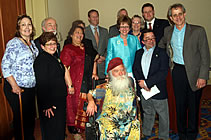Act Now

Empower U: Learn to Access Your Disability Rights Training on Canadian Human Rights, the Convention on the Rights of Persons with Disabilities (CRPD) and its Optional Protocol (OP) training aims to increase awareness of how to address discrimination using more familiar Canadian human rights laws such as Human Rights Codes and the newer international Convention on the Rights of Persons with Disabilities (CRPD). This is training for persons with disabilities by persons with disabilities. The training is part of a project funded by Employment and Social Development Canada and implemented by the Council of Canadians with Disabilities (CCD) in collaboration with Canadian Multicultural Disability Centre Inc. (CMDCI), Citizens With Disabilities – Ontario (CWDO), Manitoba League of Persons with Disabilities (MLPD) and National Educational Association of Disabled Students (NEADS). Read more.
Sign Up for our monthly digest
A monthly newsletter from CCD about what is happening in the community
Official Development Assistance to the World Bank
Related Documents
June 4, 2010
Canadian Council for International Co-operation (CCIC) May Be Defunded
August 10, 2006
War and Peace: Disability Issues
January 25, 2003
Peace Is A Disability Issue
CCD Response to
Department of Finance Consultation on
Official Development Assistance to the
World Bank
Introduction
The Council of Canadians with Disabilities (CCD), a national organization working for an inclusive and accessible Canada, welcomes the opportunity to contribute to the Department of Finance consultation, examining Canadian funding to the World Bank. On development assistance, CCD has a unique perspective, gained through three significant activities: membership in international organizations, conducting international projects, and a human rights practice.
Since 1981, CCD has been a member of Disabled Peoples’ International (DPI). From 1984 - 2000, CCD undertook disability awareness education with Canadian development agencies, encouraging the inclusion of people with disabilities in development projects, and, in collaboration with DPI member organizations, CCD undertook projects in developing countries. CCD collaborated in the processes leading to the Convention on the Rights of Persons with Disabilities (CRPD) and Canada’s ratification of the CRPD.
The current consultation is examining whether the World Bank’s activities are consistent with the Official Development Assistance Accountability Act’s requirement that aid contributes to poverty reduction, includes the perspectives of the poor and is in keeping with human rights standards. While CCD holds that the World Bank’s programme is consistent with the objectives established by the aforementioned Act, CCD is recommending that Canada work with the World Bank to strengthen its performance in three areas.
Poverty Reduction
Poverty and disability are interconnected phenomena. For poverty reduction strategies to be successful, their design and reach must be inclusive of people with disabilities. CCD notes that the World Bank has been working to strengthen outcomes for people with disabilities. In 2002, CCD participated in a study titled “Baseline Assessment Inclusion and Disability in World Bank Activities”, commissioned by the World Bank. The “Baseline Assessment” observed that while the World Bank’s work was not fully inclusive of people with disabilities, there were “pockets of activity” underway. The Word Bank has continued to pursue inclusion. For example, with the World Health Organization, the World Bank published the World Report on Disability, which provides guidance on how to develop an inclusive and accessible society. In correspondence (dated 25 April 2012), Robert B. Zoellick, then President of the World Bank, reported to the Lebanese Physical Handicapped Union that, “Mainstreaming is the principal strategy that we use to provide support – directly or indirectly – to persons with disabilities. As you pointed out, the World Bank has made significant progress over the last decade. Between 1990 and 2000, only about one-third of social investment fund projects included disability. In the next decade (2000-2010), that was the case with two-thirds of such projects.” CCD notes that while social investment is important, all investment needs to be inclusive of people with disabilities.
It would be beneficial for Canada to promote with the World Bank the robust implementation of the twin-track approach to disability and development. With the twin-track model, all activities undertaken are disability-sensitive and there are also disability-specific measures that provide for inclusion and the improvement of living conditions of persons with disabilities, as well as the promotion of their empowerment.
Inclusion of the Perspectives of the Poor
CCD acknowledges that the World Bank engages with stakeholders, including people who are poor. For example, the World Bank is conducting a two-year process to review and update its environmental and social protection safeguards. In the review’s documentation, the World Bank commits to holding focus groups with a sample of project affected communities. Moreover, when he was president of the World Bank Robert B. Zoellick committed to consulting with people with disabilities during this review. On 22 January 2013, in Ottawa, CCD participated in a World Bank consultation about safeguards.
It would be beneficial for Canada to impress upon the World Bank that meaningful consultation requires the involvement of the self-representational organizations of people with disabilities, as this ensures accountability to people with disabilities affected by development projects. Furthermore, inclusive consultations require the accommodation of participants with disabilities through the provision of accessible information and venues.
Consistency with Human Rights Standards
According to the World Bank’s documentation, human rights and disability are “emerging” issues for consideration during the safeguard setting process. CCD holds that human rights have moved beyond being a topic for consideration. The United Nations Convention on the Rights of Persons with Disabilities (CRPD) elaborates human rights in the context of disability.
In the Ottawa consultation of 22 January 2013, CCD became aware that there has been a shift in lending approaches; as a result, public servants’ and teachers’ salaries are now increasingly covered. CCD submitted that this shift provides an opportunity for the World Bank to pursue with borrowing countries disability-beneficial measures, consistent with specific CRPD state obligations, such as: employment equity or affirmative action initiatives, public procurement policies to enhance accessibility, and inclusive education. World Bank officials expressed interest in such concrete ideas.
In line with the Official Development Assistance Accountability Act’s focus on human rights, it would be appropriate for Canada to encourage the World Bank to revise its safeguards to make them more effective in achieving human rights-compliant results, including particular measures designed and intended to benefit persons with disabilities.
CCD notes that many borrowing countries have ratified CRPD, undertaking, thereby, to implement measures consistent with the approaches advanced in the present submission. Therefore, CRPD could be a useful guide in the World Bank’s desire to assist borrowing countries build their capacity.
Conclusion
To ensure that the funds Canada commits to the World Bank have an impact on people with disabilities, CCD encourages Canada to promote at the World Bank, policies that advance access and inclusion. In particular, CCD recommends that Canada’s appointees to the World Bank promote a twin-track approach to disability and development, consultation with people with disabilities affected by World Bank programming and safeguards grounded in human rights, with a particular emphasis on the Convention on the Rights of Persons with Disabilities.
References
Civil Society Action Alert: World Bank Safeguard Review. Accessed on line on 26 January 2012 at http://www.bicusa.org/en/Issue.Resources.61.aspx.
Letter from Robert B. Zoellick, President of the World Bank, to Mohammed Ali Loutfy, the Lebanese Physical Handicapped Union (25 April 2012). Accessed on line on 26 January 2012 at http://www.bicusa.org/en/Issue.Resources.61.aspx.
The World Bank’s Safeguard Policies: Review and Update Overview (January 2013).

Canada signs the Declaration on the Rights of Persons with Disabilities at the United Nations. Members of the Canadian Delegation Steve Estey, Chair of CCD’s International Committee, and Dulcie McCallum observe Canada’s ambassador make this historic commitment.

HRSDC Minister Diane Finley, Defense Minister Peter MacKay, NDP Disability Critic Judy Wasylycia-Leis, Liberal MP Mike Savage, Liberal MP the Hon. Carolyn Bennett and Bloc MP Yves Lessard joined leaders from the disability community at a CCD celebration of Canada's ratification of the CRPD.
